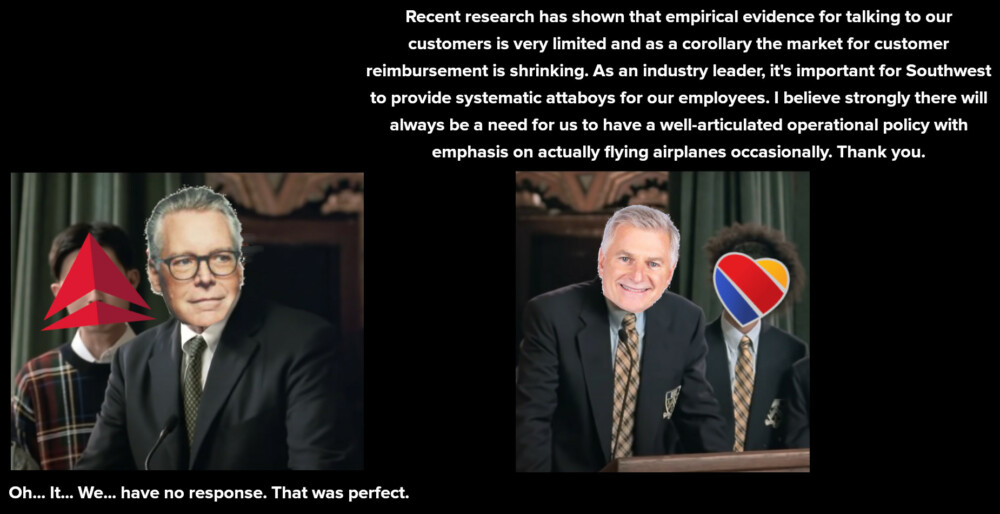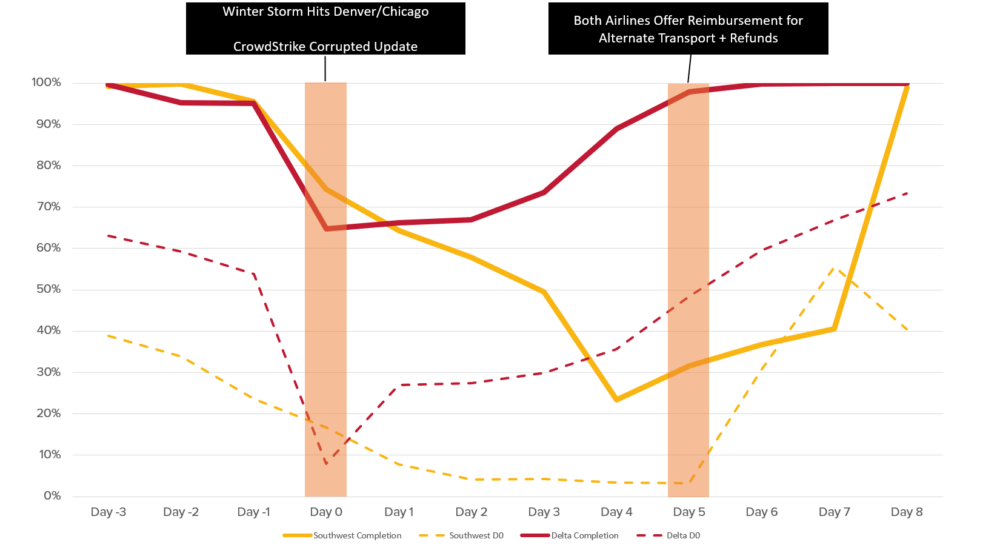On July 19th, the world learned of CrowdStrike. That day, the company downloaded a corrupted update onto its customers’ Windows operating system computers, and those computers immediately turned into bricks. This immediately made CrowdStrike the villain in all the news stories, but as the days went by, Delta took over. Today, as Delta’s operations have returned to normal, we can look back and see… what a terrible job this airline did to weather the crisis. It’s astounding how little the airline seems to have learned from Southwest, which went through a surprisingly similar situation.

The collapse of the South-West in 2022 should have set the tone
With Southwest, it was another catalyst that set things in motion. On December 20, 2022, a terrible winter storm hit the middle of the country, bringing problematic winds and cold temperatures from Denver to Chicago. All airlines felt the pain, but most recovered normally. Southwest, on the other hand, simply couldn’t get its act together.
The airline’s systems were overwhelmed as it tried to cope with all the problems that arose during the storm. It became impossible to get planes, crews and passengers together in one place. The airline lost track of its crews and had to drastically reduce its schedule before it could return to normal operations. It took eight long days before it was able to return to anything resembling normal operations.
Meanwhile, the airline sat silent as passengers desperately tried to figure out how to get to their destination. They were left stranded. Eventually, Southwest apologized, handed out a ton of frequent flyer miles, and offered to reimburse travelers for reasonable expenses. That last part, however, didn’t happen until five days after the bad weather hit.
The airline was dragged through the mud because of its poor response. The Department of Transportation fined Southwest Airlines $140 million. It was hit hard at the time, and it’s not hard to say that the airline is still suffering from the fallout from demand today.
Given all this, you would think that every airline would have looked at Southwest’s response as a classic example of what NOT to do. So when Delta found itself in a similar situation this month, you would have hoped it would do better. But that’s not the case.
Delta lowers the bar
Even though the faulty CrowdStrike update impacted several airlines, almost all of them were operating properly by the end of the weekend. According to Anuvu’s data, on Sunday the 22nd, United canceled 10% of flights and Spirit canceled 15%, but Delta was at 33%, so it was pretty clear that something was wrong at Delta.
Completion Factor and On-Time Departures During Delta and Southwest Collapses

Data via Anuvu
So what did Delta do? It issued regular updates on Fridays during the outage, but then it only issued one a day on Saturday and Sunday, describing the extended waivers and telling people what they couldn’t get refunds for. And those updates kept blaming the computer outage, even though it was clearly a bigger problem. That’s exactly what Southwest did with the weather in 2022.
Meanwhile, Delta continued to make mistakes. It canceled a third of its operations over the weekend, failed to offer refunds to people who had to buy tickets from other airlines, and even implemented a travel ban on unaccompanied minors, which was later extended through July 23. This made operational sense, but the airline simply left children stranded. This is not how it should have happened.
CEO Ed Bastian’s first communication finally arrived Sunday afternoon, and he kept talking about this technology failure. Nobody cared. People were stuck in airports, and nobody wanted to hear about what had happened two days before. They just wanted to get on a flight.
The wrong tone
Delta’s communications have been marked by a certain arrogance. The AP reported that Ed ignored Transportation Secretary Pete Buttigieg’s reminder of the airline’s responsibilities:
Bastian said in a video to employees that he told Buttigieg: “You don’t have to remind me. I know that because we do our best, especially in difficult times, to take care of our customers.”
In an update Monday, Delta said:
“We have had everyone across the company working around the clock to make this operation meet its expectations,” Delta CEO Ed Bastian said in a video message to employees Monday. “Please continue to take great care of our customers and each other in the days ahead.”
Even simple tweets broadcasting the airline’s communications found a way to suggest that Delta had done a great job taking care of everyone.
I want to emphasize that these criticisms are not a reflection of Delta’s front line. There was no way they could have taken care of everyone when the airline collapsed like this. It’s simply not humanly possible. For those stuck at the airport or on endless hold on calls, it was as if the airline’s management was living in a parallel universe where they were congratulating themselves.
And every time, CrowdStrike was blamed. It called the problem a “CrowdStrike outage,” much like some on the right call COVID the “Chinese virus.” When people are stuck in an airport, the last thing they want to do is blame each other. They want to hear excuses and then find out when the problem will be fixed. The communication style only muddied the message that things were getting better faster than they were at Southwest.
It certainly would have helped if the airline’s technology worked better to facilitate rebooking. Delta said it had rebooking options available through electronic channels, but many found that those options didn’t work at all or that the option disappeared at some point. (If you don’t subscribe to Air Show co-host Brian Sumers’ The Airline Observer , you can read about his family’s experience.)
Once normal operations were restored, Delta had one last chance. Finally, on Wednesday, Delta agreed to refund travelers who had purchased tickets on other airlines. This came five days after the initial problem, the same amount of time it took Southwest Airlines to implement the exact same thing in 2022.
But it seems more like a strategy. For Delta, day five was the first day it resumed operations as normal. That means anyone who could afford to buy an expensive ticket on another airline will now be refunded. But anyone who couldn’t afford another ticket? Well, too bad they’re in their shoes.
Now what?
We don’t have a full autopsy of what happened at Delta, and I don’t expect we will. Delta is not the kind of airline that’s just going to reveal its identity unless the feds talk sense into it. But we do know that the airline had serious problems with its crew scheduling system. It sounds a lot like what happened to Southwest.
Honestly, I’m not really interested in this at this point. I’m more curious about how this will impact Delta going forward. Delta loves competition and thinks it’s the best. It’s taken the initiative to take on Alaska in Seattle and JetBlue in Boston. It’s competing fiercely with United (and others) in New York and pretty much everyone else in Los Angeles. There’s Sun Country in Minneapolis and Atlanta, it’s hard to say it’s competing with anyone, but Southwest offers a nice little alternative. Will Delta take a hit?
The timing couldn’t have been worse for the airline’s lucrative sales operations. Last week was the annual Global Business Travel Association (GBTA) conference. This is where all the airlines host business travel buyers. It’s a big event with over 5,000 attendees. And did I mention it was in Atlanta this year? Delta has a LOT of apologies to make to the people who couldn’t make it as planned. Let’s hope it can find the humility to do so.
Southwest Airlines felt a real impact after the 2022 crisis, and I expect Delta will feel a real pain as well. It could have mitigated some of that impact if it had responded differently, but hey, it didn’t. Now others will try to take advantage of Delta’s rare misstep.